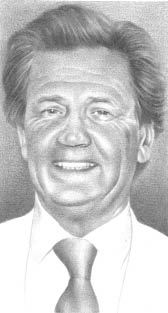Torn with grief, Melvyn Bragg has produced a condolence book for the South Bank Show (born 1978, died of neglect, 2010). These 25 vignettes, based on the best of his interviews, are more than just the cosy clippety-cloppety sounds of an old cowboy trotting into the sunset. They offer intriguing comments on the film-making process and present valuable new insights into their subjects. Most have the shape and phrasing of short stories and his meetings with the gravest maestros read like mini-epics. We watch plucky little Melvyn as he approaches the armoured titan in his lair, tempts him forth and charms him into dropping his guard.
He meets Francis Bacon at 9 am and finds six bottles of champagne waiting on the table, one open. ‘I knew if I did not drink glass for glass,’ Bragg reflects pragmatically, ‘Francis would suspect I was trying to get the drop on him.’
Bacon turns out to be a savage critic of conceptual art, not excluding his own. ‘A disaster. I wish they’d burn it,’ he says of his ‘Study for Portrait on Folding Bed.’ Pollock elicits a confession: ‘Some old cow asked me what I thought and I said it was like a bit of old lace.’ On Rothko: ‘I hate that dirty maroon colour.’ Asked what his oeuvre means, he is emphatic: ‘Nothing. Except what people want to read into it. Nothing.’ Which confirms the view that abstract art, like astrology, is predicated on the bizarre human desire to find meaning in meaningless objects.
Bragg assures us his films were never about their presenter. And he expects us to believe him! We all remember the slightly-too-frequent cutaways to the dreamily handsome inquisitor in his armchair. It was part of the show. That air of restful grandeur, those sumptuous shirtings, the prancing chestnut quiff, and the troubled face, with its generous vigilance, and its capacity to bloom suddenly into an aggressive Blair-like grin. Bragg was always a player in his gallery, and deservedly so. Here he limits his intrusions to the odd virtuoso flourish. He describes Martin Amis busy with his rollies: ‘The layering of fragile tobacco in those flimsy little rectangles of paper, the careful rather animal licking of the glue, the lighting up, were all useful forms of punctuation.’
Elsewhere he can conjure a mood or a character detail in a sentence or two. Bergman arrives. ‘He took control. It’s what he does.’ The Swedish director sets to work re-arranging the interview room, pushing the chairs closer, fixing the lights, leaving a door half open. ‘For these few minutes our television crew was his film crew — and glad to be so.’ Bragg’s opening line on Judi Dench finds the crux of her appeal in three words. ‘It’s the range.’
He meets Rudolf Nureyev, past his best now, but the serene freeholder of a small archipelago in the lap of the Amalfi coast. Bragg depicts him as a magical sprite, a prodigy of athleticism and self-invention, who leapt from the oppressive sterility of the Tartar backwaters to the palatial splendours of worldwide success. In its impossible simplicity the story has the arc of a pantomime or an oral myth and Bragg’s brief essay captures its essence. Looking at footage of the dancer in his prime, Bragg is thrilled by
the speed and the precision, the grace, the feather lightness of his movement, the mysterious but ‘observable’ hovering in the air, the attack and total immersion.
And, tellingly, he adds his gratitude that ‘television arrived to record such moments.’ It’s a point he labours less strenuously than he might.
Bragg’s book is a thesaurus of delights which demands to be supplemented with further volumes. Yet its arrival is a moment of acute cultural embarrassment. We can’t see what we’ve lost until it’s gone. The South Bank Show developed over three decades into the world’s most comprehensive televisual archive of the creative arts. And now — phff — it’s over, just like that. A bomb has hit the studio and silenced the master in mid-flow. If this had happened to a pottery circle for penitent muggers there’d be uproar. That the show’s demise isn’t a national scandal is a national scandal. There’s no reason why the project shouldn’t be reinstated. The need is pressing. The funds, the creative will and the airtime, (BBC4), are readily available. The rest is easy.







Comments